7 Best Herbal Tinctures For Arthritis
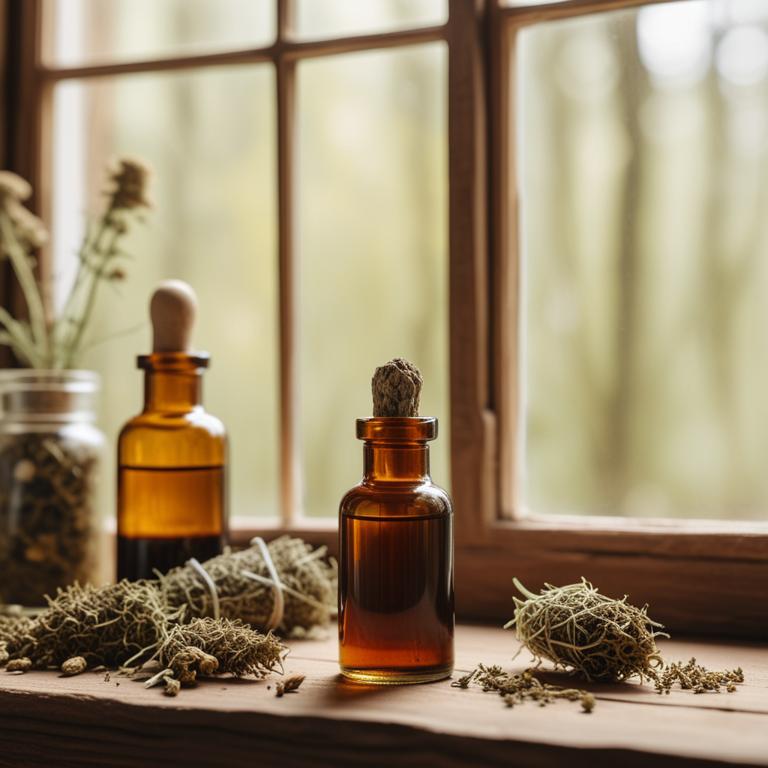
Herbal tinctures for Arthritis are liquid extracts made from plants and herbs that have anti-inflammatory and pain-relieving properties, used to treat the symptoms of arthritis.
These herbal remedies have been shown to provide relief from joint pain and inflammation, improving the overall quality of life for individuals suffering from this debilitating condition.
Some examples of herbal tinctures used to treat arthritis include turmeric tincture, which contains curcumin that reduces joint inflammation; ginger tincture, which has anti-inflammatory properties that relieve pain; willow bark tincture, which contains salicin that reduces inflammation and pain; boswellia tincture, which reduces joint inflammation and pain; and cayenne pepper tincture, which reduces pain by blocking pain receptors.
By incorporating these herbal tinctures into their treatment plan, individuals can potentially reduce their reliance on pharmaceuticals and experience a more natural approach to managing their arthritis symptoms.
According to "Molecular biology reports", tinctures for arthritis may help manage symptoms by up-regulating antioxidant potential, inhibiting cartilage degradation, down-regulating inflammatory cytokines, and suppressing oxidative stress, as some medicinal plants like Curcuma longa, Syzygium aromaticum, Zingiber officinale and Withania somnifera have been found to have potential benefits in treating rheumatoid arthritis.
Below there's a list of the 7 best herbal tinctures for arthritis.
- 1. Glycyrrhiza glabra tinctures
- 2. Curcuma longa tinctures
- 3. Harpagophytum procumbens tinctures
- 4. Silybum marianum tinctures
- 5. Boswellia serrata tinctures
- 6. Rheum officinale tinctures
- 7. Zingiber officinale tinctures
Also you may be interested in...
TODAY'S FREE BOUNDLE
Herb Drying Checklist + Herbal Tea Shopping List + Medicinal Herbs Flashcards
Enter you best email address below to receive this bundle (3 product valued $19.95) for FREE + exclusive access to The Aphotecary Letter.
$19.95 -> $0.00
1. Glycyrrhiza glabra tinctures

Glycyrrhiza glabra tinctures have been used traditionally to treat arthritis due to their anti-inflammatory and analgesic properties, which help to reduce joint pain and swelling.
The bioactive constituents, including glycyrrhizin and flavonoids, have been found to inhibit the production of pro-inflammatory enzymes and cytokines, thereby reducing inflammation and alleviating symptoms.
By modulating the immune response and reducing oxidative stress, Glycyrrhiza glabra tinctures help to promote joint health and reduce the severity of arthritis symptoms.
The benefits of using Glycyrrhiza glabra tinctures to treat arthritis include reduced joint pain and swelling, improved mobility, and enhanced overall quality of life.
Related Study
According to "Inflammopharmacology", Glycyrrhiza glabra tinctures for arthritis have shown potential in reducing inflammation and symptoms, as the study on its bioactive extract IVT-21 revealed significant reductions in arthritis index, inflammation mediators, and pro-inflammatory cytokines in rats with collagen-induced arthritis.
2. Curcuma longa tinctures

Curcuma longa tinctures have been traditionally used to treat arthritis due to their anti-inflammatory and antioxidant properties, which help to reduce joint pain and inflammation.
The bioactive constituents of Curcuma longa tinctures, including curcuminoids, flavonoids, and phenolic acids, inhibit the production of pro-inflammatory enzymes and cytokines, thereby alleviating arthritis symptoms.
By modulating the immune response and reducing oxidative stress, Curcuma longa tinctures help to treat arthritis by improving joint mobility and reducing pain and stiffness.
The benefits of using Curcuma longa tinctures to treat arthritis include reduced reliance on conventional medications, improved quality of life, and potential long-term prevention of joint damage and disability.
Related Study
According to "Current rheumatology reviews", Curcuma longa tinctures for arthritis have been shown to exhibit medicinal benefits in managing osteoarthritis by suppressing inflammation and slowing the progression of the condition.
3. Harpagophytum procumbens tinctures
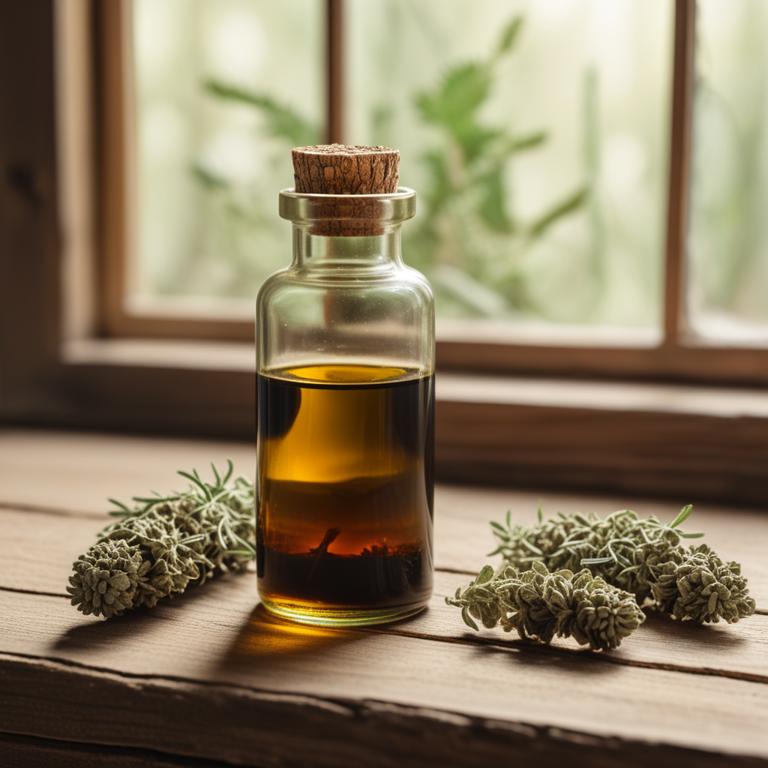
Harpagophytum procumbens tinctures are a natural remedy used to treat arthritis due to their anti-inflammatory and pain-relieving properties.
The tinctures contain bioactive constituents such as harpagoside, which helps to reduce inflammation and pain in the joints, making it easier to manage the symptoms of arthritis.
By reducing inflammation and alleviating pain, Harpagophytum procumbens tinctures provide relief from the stiffness and discomfort associated with arthritis, allowing individuals to maintain their mobility and quality of life.
Regular use of Harpagophytum procumbens tinctures has been shown to improve joint function and overall well-being, making it a popular natural treatment for arthritis.
Related Study
According to "Phytotherapy research : PTR", Harpagophytum procumbens tinctures for arthritis may be beneficial due to their antioxidant effects which may contribute to the anti-inflammatory and analgesic properties of the plant.
4. Silybum marianum tinctures
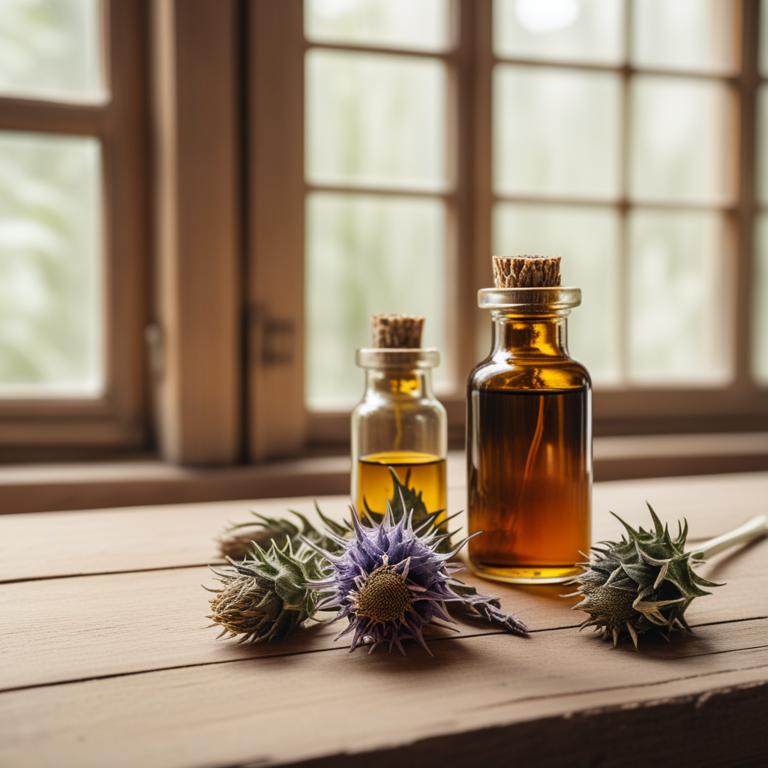
Silybum marianum tinctures, also known as St. Mary's thistle tincture, have been traditionally used to treat arthritis due to its anti-inflammatory and antioxidant properties.
The bioactive constituents of Silybum marianum, including silymarin and flavonoids, help to reduce inflammation and oxidative stress in the body, which are common contributors to arthritis.
By reducing inflammation and oxidative stress, Silybum marianum tinctures may help to alleviate arthritis symptoms such as pain and stiffness, improving the overall quality of life for individuals suffering from this condition.
The benefits of using Silybum marianum tinctures to treat arthritis include reduced pain and inflammation, improved joint mobility, and enhanced antioxidant defenses, making it a potentially effective natural remedy for this common ailment.
5. Boswellia serrata tinctures
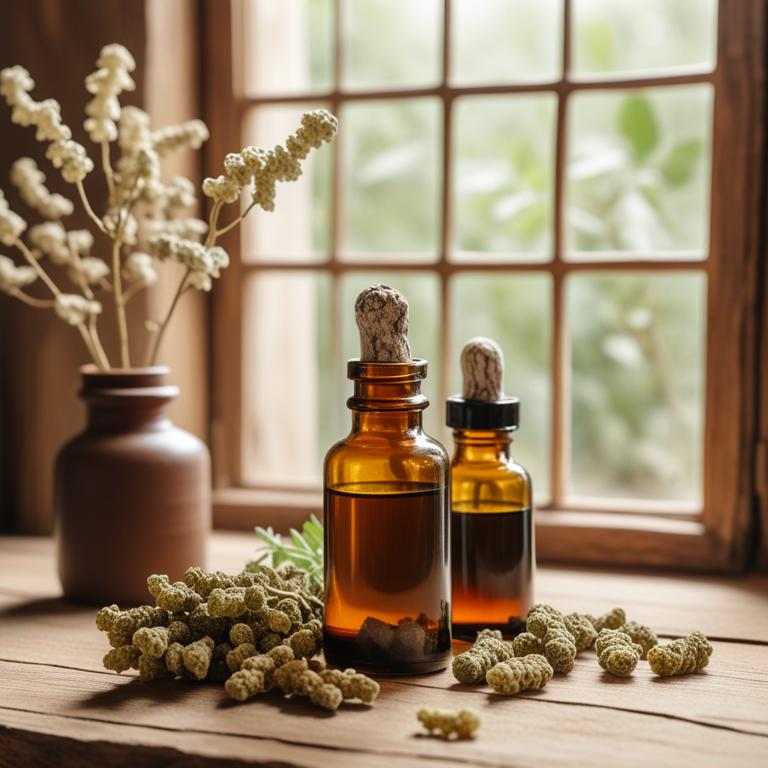
Boswellia serrata tinctures have been traditionally used to treat the arthritis ailment due to their anti-inflammatory and pain-relieving properties.
The tinctures contain bioactive constituents such as boswellic acids, particularly alpha-boswellic acid and beta-boswellic acid, which help to reduce inflammation and prevent the production of pro-inflammatory enzymes.
By inhibiting the production of pro-inflammatory enzymes and reducing inflammation, Boswellia serrata tinctures help to alleviate the pain and discomfort associated with arthritis.
The benefits of using Boswellia serrata tinctures to treat arthritis include reduced joint pain and inflammation, improved range of motion, and enhanced overall quality of life.
Related Study
According to "Journal of ethnopharmacology", Boswellia serrata tinctures for arthritis showed a significant drop in severity of pain (P less than 0.001) and disability score (P less than 0.05) in patients with osteoarthritis.
6. Rheum officinale tinctures
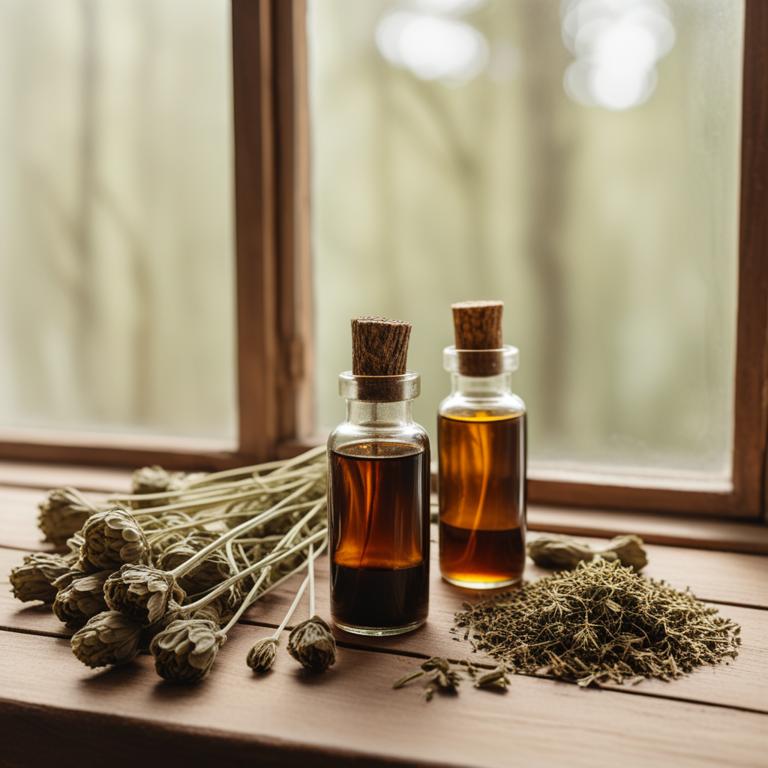
Rheum officinale tinctures have been traditionally used to treat arthritis due to their anti-inflammatory and pain-relieving properties, which help to reduce joint inflammation and alleviate associated pain.
The bioactive constituents of Rheum officinale, including rhein, emodin, and anthraquinones, have been shown to exhibit analgesic and anti-inflammatory activities that contribute to its therapeutic effects.
By reducing inflammation and relieving pain, Rheum officinale tinctures can help to improve joint mobility and function, making it a potential natural remedy for managing arthritis symptoms.
The benefits of using Rheum officinale tinctures to treat arthritis include reduced reliance on pharmaceutical medications, lower risk of adverse reactions, and improved overall quality of life for individuals suffering from this condition.
7. Zingiber officinale tinctures

Zingiber officinale tinctures, derived from the rhizome of the ginger plant, have been traditionally used to treat arthritis due to their anti-inflammatory and analgesic properties.
The bioactive constituents, including gingerols and shogaols, help to reduce joint inflammation and alleviate pain by inhibiting the production of pro-inflammatory enzymes and cytokines.
These compounds also have antioxidant properties, which help to protect the joints from oxidative stress and damage, thereby providing relief from arthritis symptoms.
Regular use of Zingiber officinale tinctures has been shown to improve joint mobility and reduce pain, making it a beneficial herbal preparation for managing arthritis.
Related Study
According to "Arthritis and rheumatism", Zingiber officinale tinctures for arthritis were found to have a moderate effect in reducing symptoms of osteoarthritis of the knee, with 63% of patients experiencing a reduction in knee pain on standing, and a statistically significant effect on reducing symptoms compared to the placebo group.